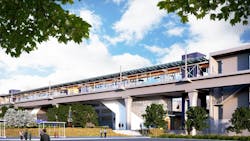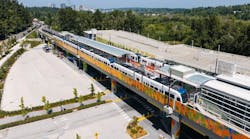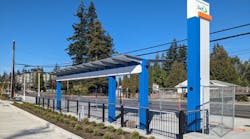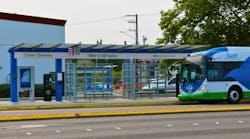Sound Transit to mitigate crowding when Lynnwood Link extension opens
Sound Transit has revealed a series of actions the agency will take to mitigate crowding and improve the experience for passengers when the Lynnwood Link extension opens later this year. Among the steps the agency is proposing are increased storage capacity for trains, which allows for more frequent service during peak hours, and alternative bus service between Snohomish County and Seattle, Wash., including the introduction of a new temporary ST Express route.
“Snohomish County’s residents are eager to take advantage of improved mass transit and additional commuting options, particularly as Lynnwood Link prepares to launch,” said Sound Transit Board Vice Chair and Snohomish County Executive Dave Somers. “We want people to use Link when it opens since it is both convenient and good for the environment. By addressing the board’s concerns about crowding, Sound Transit is proactively preparing for improved service for transit users across the region and we greatly appreciate the responsiveness.”
“This action makes good on our commitment to open the starter line in East King County and will help make Lynnwood Link service much more reliable when it opens,” said Sound Transit System Expansion Committee Chair and King County Councilmember Claudia Balducci. “Frequency is freedom: Our system works best when it is frequent enough that people can ride without a schedule. I want to thank staff from Sound Transit and our partners at King County Metro and Community Transit for working so creatively to arrive at a solution that will benefit our entire region.”
Originally, Sound Transit’s Link 2 Line was scheduled to open before the Lynnwood Link extension. The delay in the opening of the 2 Line over Lake Washington means the Lynnwood extension does not have access to the new Operations and Maintenance Facility (OMF) East in Bellevue, where the agency was planning on storing new rail cars. Sound Transit says its OMF Central in SODO is already at full capacity, limiting storage options and creating the potential for very crowded conditions on trains when the Lynnwood extension opens.
As a result, Sound Transit had originally projected running four-car trains every 10 minutes during peak hours. Under the new plan, four-car trains will run every eight minutes during peak hours. Sound Transit will also deploy gap trains and extra trains as they are available during the busiest periods, when platform crowding is identified by the Link Control Center. The agency routinely deploys gap trains and extra trains during special events, such as concerts and sporting events.
The changes will create 25 percent more capacity on trains and reduce crowding, especially during afternoon peak hours. The additional capacity is possible due to Sound Transit and King County staff locating temporary storage sites for up to 36 additional vehicles outside of the OMF Central at various sites along the 1 Line. With the extra vehicles, the maximum storage capacity of 140 vehicles will be assigned to the OMF, 35 percent more than was designed to manage safety inspections and maintenance activities.
While the new service schedule will reduce crowding and improve frequency, Sound Transit notes it does come with tradeoffs. Because of the extra maintenance required for the increased number of vehicles, the agency is reducing some off-peak service levels. Starting around 8 p.m., service will move from 10-minute to 12-minute headways, allowing for more vehicle maintenance in the evening. Passengers may also experience variability in train length, timeliness and cleanliness as a result of the updated maintenance schedule.
Besides the increased frequency in light-rail service, Sound Transit is collaborating with Community Transit on ST Express alternatives for direct service from Snohomish County until the 2 Line is complete. The proposal includes adding a new temporary Route 515 from Lynnwood, running in the peak direction every 10 minutes. It would also temporarily retain Route 510 from Everett, Wash., with service in the peak direction every 15 minutes. The routes will provide additional travel options to riders to avoid 1 Line crowding. Routes 512 and 513 would connect to Link at Lynnwood, not Northgate as they currently do.
“We couldn’t have accomplished these improvements without our staff and our partners joining in a collaborative effort to find innovative answers to the problems that we were facing,” said Sound Transit CEO Goran Sparrman. “Their hard work has yielded a workable solution that will benefit riders until we are able to open the full 2 Line.”
“These steps to reduce crowding and provide better service for passengers are a result of transit agencies working together to deliver solutions for our shared regional riders. King County operators and staff have stepped up to identify and implement these changes,” said King County Metro General Manager Michelle Allison. “We know that these changes aren’t always going to be easy but it’s a testament to our staff’s commitment that they are willing to take these steps to help improve the experience for riders.”
The Lynnwood Link extension is currently scheduled to open by fall 2024. Pre-revenue and simulated service for the extension is planned to begin in the second quarter of this year.
When the Lynnwood extension opens, riders will enjoy fast, frequent and reliable service between south Snohomish County, the University of Washington, downtown Seattle and Sea-Tac Airport. The extension includes four new stations serving Lynnwood, Mountlake Terrace, Shoreline and Seattle.
“When the 1 Line opens in Lynnwood, it will connect Snohomish County to the rest of the region and upgrade the speed and reliability of travel to and from Seattle,” said Community Transit CEO Ric Ilgenfritz. “Community Transit will leverage the Link investment by shifting downtown commuter bus routes into a dramatic expansion of local bus service in Snohomish County, including higher frequency on many existing routes and several new routes. County residents will have better connections within the county, along with new express routes and high frequency routes like the Swift Orange and Swift Blue lines directly to light-rail stations. I am grateful to Sound Transit for bringing creative solutions to the table to ensure our two systems are effectively integrated for customers until Link can achieve full service levels with the 2 Line opening this year.”
“Getting the rider experience right from the beginning is essential to the success of the Lynnwood extension,” said Sound Transit Rider Experience and Operations Committee Chair and Tacoma Councilmember Kristina Walker. “The improved capacity and alternative bus service will help relieve the potential for overcrowding, making the new extension all the more attractive for passengers.”







